Advanced Financial Management: Efficient Market Hypothesis Analysis
VerifiedAdded on 2022/08/16
|12
|2959
|13
Essay
AI Summary
This assignment delves into the Efficient Market Hypothesis (EMH), examining its core tenets and the three forms of market efficiency: weak, semi-strong, and strong. It critically analyzes the EMH's ability to explain asset pricing, particularly concerning a firm's debt and equity, and explores the hypothesis's relevance to corporate managers. The essay discusses the implications of the EMH for investment strategies, portfolio management, and decision-making within a corporate finance context. It also highlights the limitations and practical applications of the EMH, providing a comprehensive overview of its role in financial markets and corporate strategy. The solution encompasses literature review, practical applications, and a conclusion that synthesizes the key arguments and findings related to the EMH, making it a valuable resource for students studying advanced financial management.
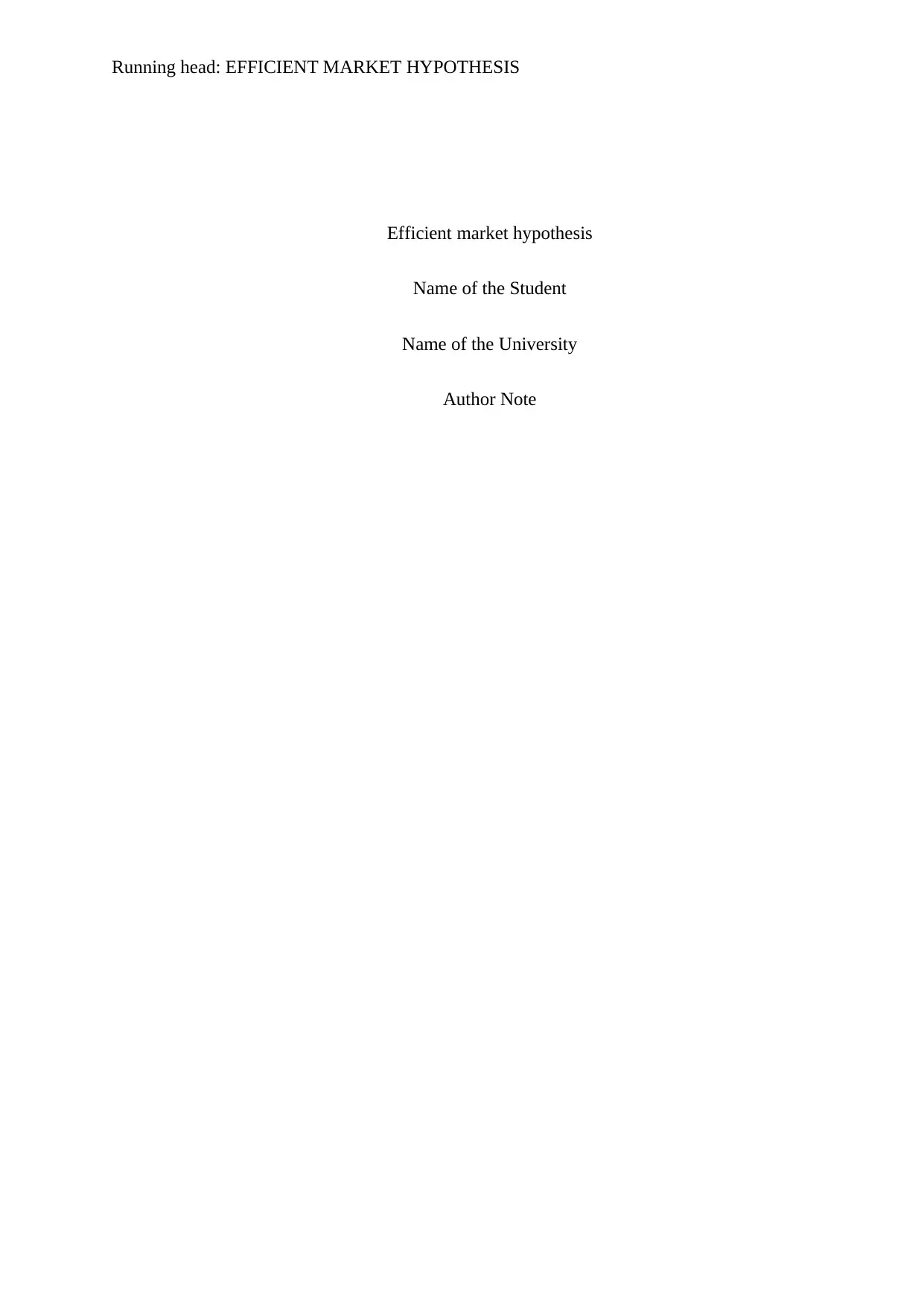
Running head: EFFICIENT MARKET HYPOTHESIS
Efficient market hypothesis
Name of the Student
Name of the University
Author Note
Efficient market hypothesis
Name of the Student
Name of the University
Author Note
Paraphrase This Document
Need a fresh take? Get an instant paraphrase of this document with our AI Paraphraser
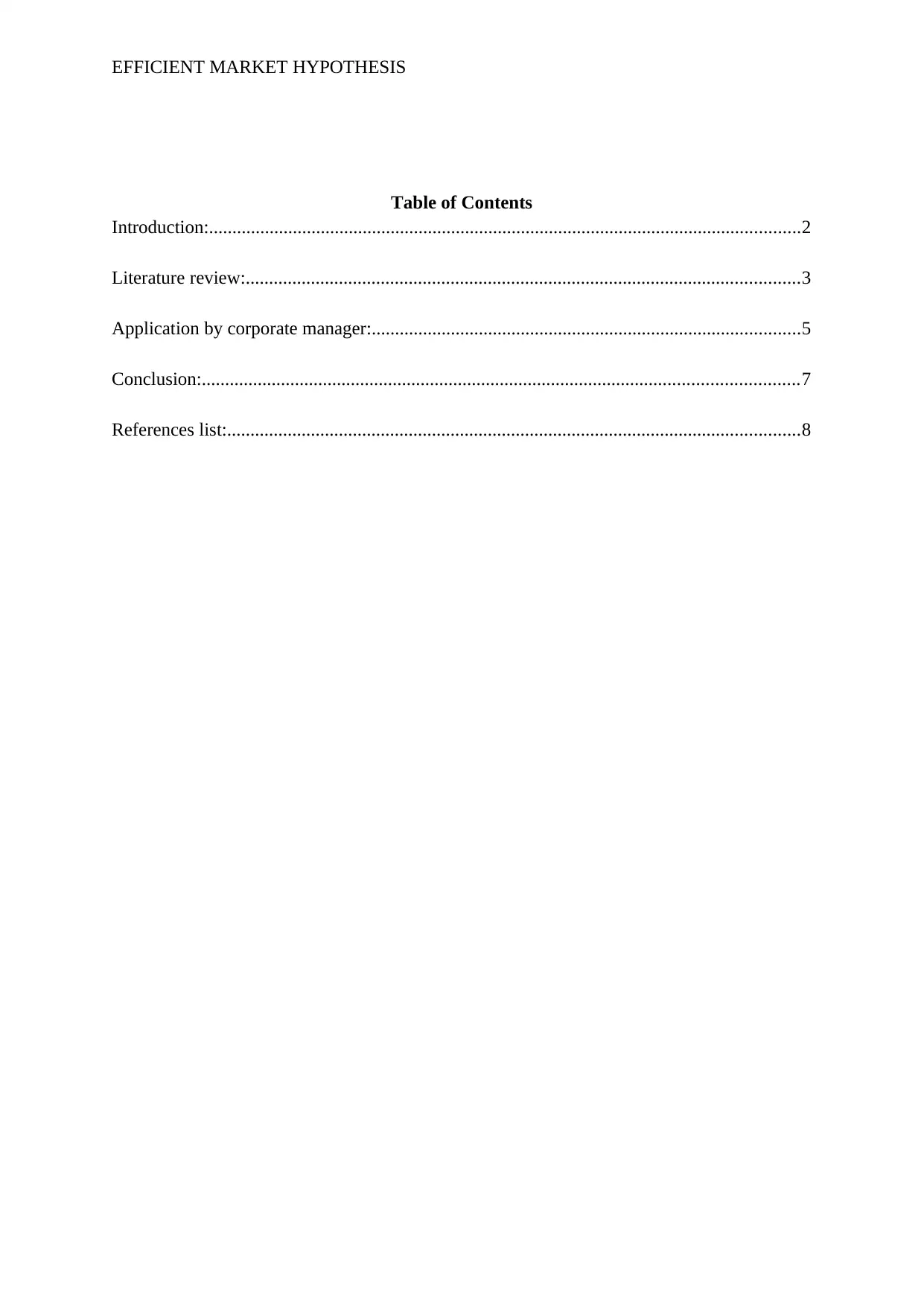
EFFICIENT MARKET HYPOTHESIS
Table of Contents
Introduction:...............................................................................................................................2
Literature review:.......................................................................................................................3
Application by corporate manager:............................................................................................5
Conclusion:................................................................................................................................7
References list:...........................................................................................................................8
Table of Contents
Introduction:...............................................................................................................................2
Literature review:.......................................................................................................................3
Application by corporate manager:............................................................................................5
Conclusion:................................................................................................................................7
References list:...........................................................................................................................8
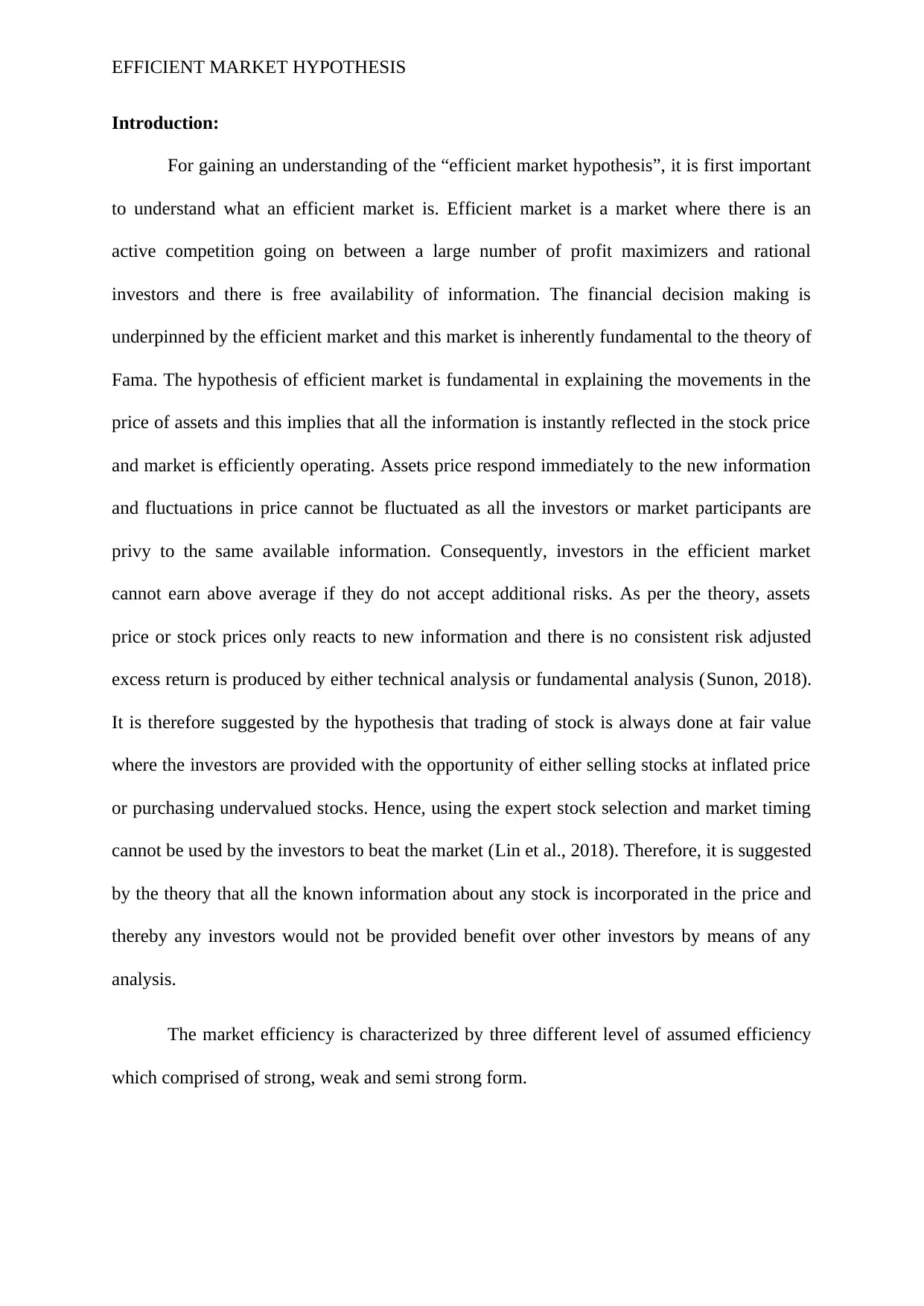
EFFICIENT MARKET HYPOTHESIS
Introduction:
For gaining an understanding of the “efficient market hypothesis”, it is first important
to understand what an efficient market is. Efficient market is a market where there is an
active competition going on between a large number of profit maximizers and rational
investors and there is free availability of information. The financial decision making is
underpinned by the efficient market and this market is inherently fundamental to the theory of
Fama. The hypothesis of efficient market is fundamental in explaining the movements in the
price of assets and this implies that all the information is instantly reflected in the stock price
and market is efficiently operating. Assets price respond immediately to the new information
and fluctuations in price cannot be fluctuated as all the investors or market participants are
privy to the same available information. Consequently, investors in the efficient market
cannot earn above average if they do not accept additional risks. As per the theory, assets
price or stock prices only reacts to new information and there is no consistent risk adjusted
excess return is produced by either technical analysis or fundamental analysis (Sunon, 2018).
It is therefore suggested by the hypothesis that trading of stock is always done at fair value
where the investors are provided with the opportunity of either selling stocks at inflated price
or purchasing undervalued stocks. Hence, using the expert stock selection and market timing
cannot be used by the investors to beat the market (Lin et al., 2018). Therefore, it is suggested
by the theory that all the known information about any stock is incorporated in the price and
thereby any investors would not be provided benefit over other investors by means of any
analysis.
The market efficiency is characterized by three different level of assumed efficiency
which comprised of strong, weak and semi strong form.
Introduction:
For gaining an understanding of the “efficient market hypothesis”, it is first important
to understand what an efficient market is. Efficient market is a market where there is an
active competition going on between a large number of profit maximizers and rational
investors and there is free availability of information. The financial decision making is
underpinned by the efficient market and this market is inherently fundamental to the theory of
Fama. The hypothesis of efficient market is fundamental in explaining the movements in the
price of assets and this implies that all the information is instantly reflected in the stock price
and market is efficiently operating. Assets price respond immediately to the new information
and fluctuations in price cannot be fluctuated as all the investors or market participants are
privy to the same available information. Consequently, investors in the efficient market
cannot earn above average if they do not accept additional risks. As per the theory, assets
price or stock prices only reacts to new information and there is no consistent risk adjusted
excess return is produced by either technical analysis or fundamental analysis (Sunon, 2018).
It is therefore suggested by the hypothesis that trading of stock is always done at fair value
where the investors are provided with the opportunity of either selling stocks at inflated price
or purchasing undervalued stocks. Hence, using the expert stock selection and market timing
cannot be used by the investors to beat the market (Lin et al., 2018). Therefore, it is suggested
by the theory that all the known information about any stock is incorporated in the price and
thereby any investors would not be provided benefit over other investors by means of any
analysis.
The market efficiency is characterized by three different level of assumed efficiency
which comprised of strong, weak and semi strong form.
⊘ This is a preview!⊘
Do you want full access?
Subscribe today to unlock all pages.

Trusted by 1+ million students worldwide
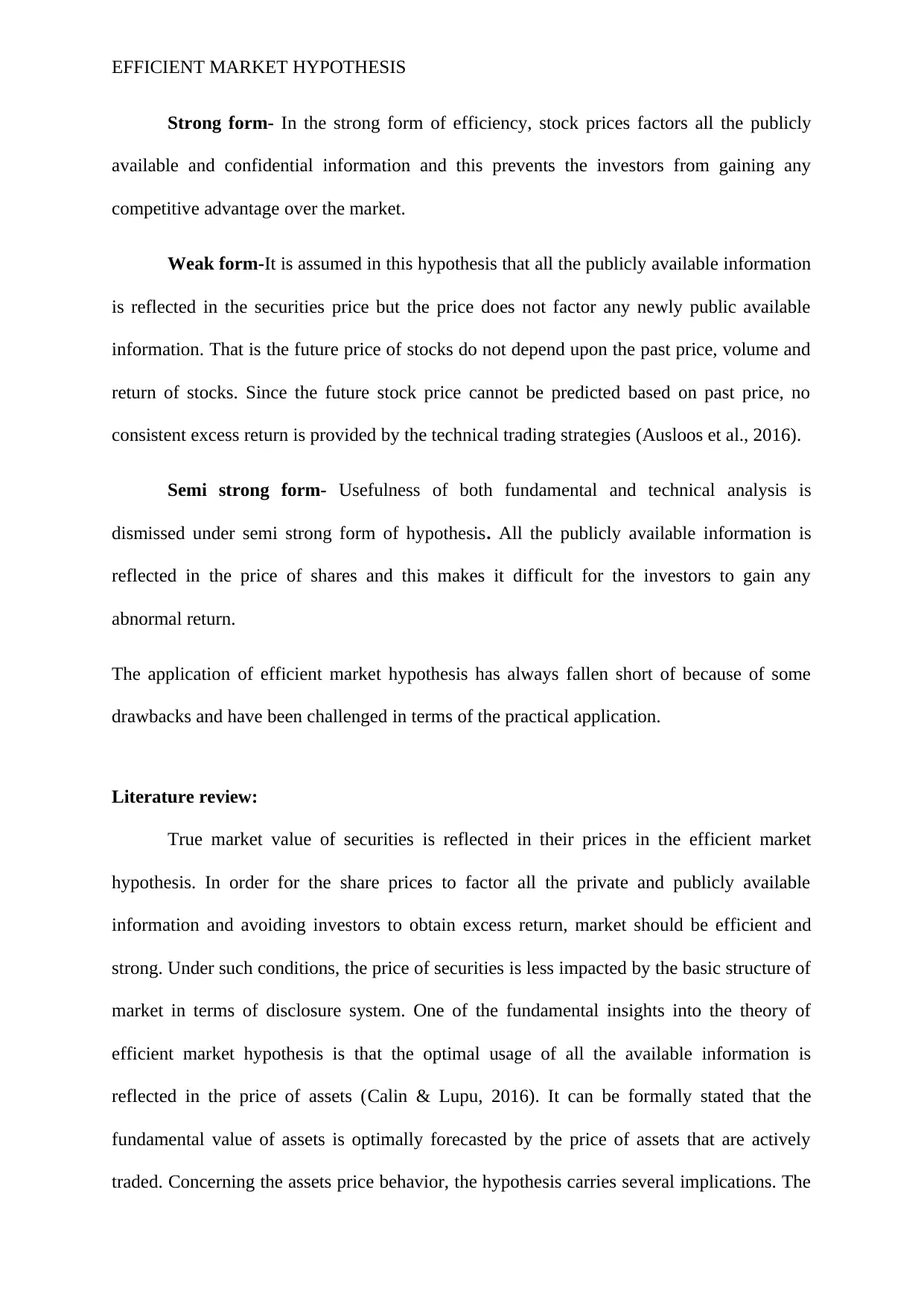
EFFICIENT MARKET HYPOTHESIS
Strong form- In the strong form of efficiency, stock prices factors all the publicly
available and confidential information and this prevents the investors from gaining any
competitive advantage over the market.
Weak form-It is assumed in this hypothesis that all the publicly available information
is reflected in the securities price but the price does not factor any newly public available
information. That is the future price of stocks do not depend upon the past price, volume and
return of stocks. Since the future stock price cannot be predicted based on past price, no
consistent excess return is provided by the technical trading strategies (Ausloos et al., 2016).
Semi strong form- Usefulness of both fundamental and technical analysis is
dismissed under semi strong form of hypothesis. All the publicly available information is
reflected in the price of shares and this makes it difficult for the investors to gain any
abnormal return.
The application of efficient market hypothesis has always fallen short of because of some
drawbacks and have been challenged in terms of the practical application.
Literature review:
True market value of securities is reflected in their prices in the efficient market
hypothesis. In order for the share prices to factor all the private and publicly available
information and avoiding investors to obtain excess return, market should be efficient and
strong. Under such conditions, the price of securities is less impacted by the basic structure of
market in terms of disclosure system. One of the fundamental insights into the theory of
efficient market hypothesis is that the optimal usage of all the available information is
reflected in the price of assets (Calin & Lupu, 2016). It can be formally stated that the
fundamental value of assets is optimally forecasted by the price of assets that are actively
traded. Concerning the assets price behavior, the hypothesis carries several implications. The
Strong form- In the strong form of efficiency, stock prices factors all the publicly
available and confidential information and this prevents the investors from gaining any
competitive advantage over the market.
Weak form-It is assumed in this hypothesis that all the publicly available information
is reflected in the securities price but the price does not factor any newly public available
information. That is the future price of stocks do not depend upon the past price, volume and
return of stocks. Since the future stock price cannot be predicted based on past price, no
consistent excess return is provided by the technical trading strategies (Ausloos et al., 2016).
Semi strong form- Usefulness of both fundamental and technical analysis is
dismissed under semi strong form of hypothesis. All the publicly available information is
reflected in the price of shares and this makes it difficult for the investors to gain any
abnormal return.
The application of efficient market hypothesis has always fallen short of because of some
drawbacks and have been challenged in terms of the practical application.
Literature review:
True market value of securities is reflected in their prices in the efficient market
hypothesis. In order for the share prices to factor all the private and publicly available
information and avoiding investors to obtain excess return, market should be efficient and
strong. Under such conditions, the price of securities is less impacted by the basic structure of
market in terms of disclosure system. One of the fundamental insights into the theory of
efficient market hypothesis is that the optimal usage of all the available information is
reflected in the price of assets (Calin & Lupu, 2016). It can be formally stated that the
fundamental value of assets is optimally forecasted by the price of assets that are actively
traded. Concerning the assets price behavior, the hypothesis carries several implications. The
Paraphrase This Document
Need a fresh take? Get an instant paraphrase of this document with our AI Paraphraser
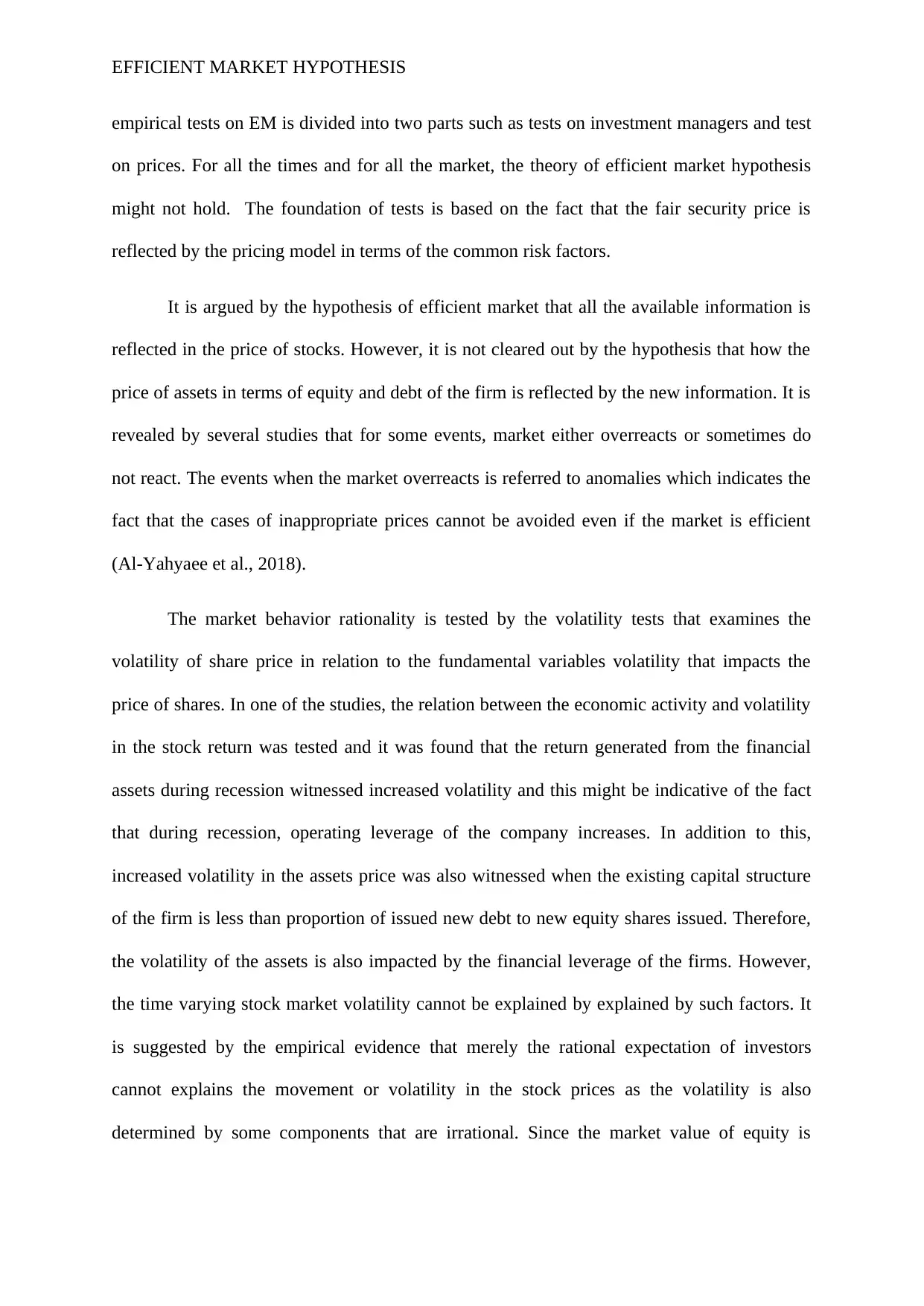
EFFICIENT MARKET HYPOTHESIS
empirical tests on EM is divided into two parts such as tests on investment managers and test
on prices. For all the times and for all the market, the theory of efficient market hypothesis
might not hold. The foundation of tests is based on the fact that the fair security price is
reflected by the pricing model in terms of the common risk factors.
It is argued by the hypothesis of efficient market that all the available information is
reflected in the price of stocks. However, it is not cleared out by the hypothesis that how the
price of assets in terms of equity and debt of the firm is reflected by the new information. It is
revealed by several studies that for some events, market either overreacts or sometimes do
not react. The events when the market overreacts is referred to anomalies which indicates the
fact that the cases of inappropriate prices cannot be avoided even if the market is efficient
(Al-Yahyaee et al., 2018).
The market behavior rationality is tested by the volatility tests that examines the
volatility of share price in relation to the fundamental variables volatility that impacts the
price of shares. In one of the studies, the relation between the economic activity and volatility
in the stock return was tested and it was found that the return generated from the financial
assets during recession witnessed increased volatility and this might be indicative of the fact
that during recession, operating leverage of the company increases. In addition to this,
increased volatility in the assets price was also witnessed when the existing capital structure
of the firm is less than proportion of issued new debt to new equity shares issued. Therefore,
the volatility of the assets is also impacted by the financial leverage of the firms. However,
the time varying stock market volatility cannot be explained by explained by such factors. It
is suggested by the empirical evidence that merely the rational expectation of investors
cannot explains the movement or volatility in the stock prices as the volatility is also
determined by some components that are irrational. Since the market value of equity is
empirical tests on EM is divided into two parts such as tests on investment managers and test
on prices. For all the times and for all the market, the theory of efficient market hypothesis
might not hold. The foundation of tests is based on the fact that the fair security price is
reflected by the pricing model in terms of the common risk factors.
It is argued by the hypothesis of efficient market that all the available information is
reflected in the price of stocks. However, it is not cleared out by the hypothesis that how the
price of assets in terms of equity and debt of the firm is reflected by the new information. It is
revealed by several studies that for some events, market either overreacts or sometimes do
not react. The events when the market overreacts is referred to anomalies which indicates the
fact that the cases of inappropriate prices cannot be avoided even if the market is efficient
(Al-Yahyaee et al., 2018).
The market behavior rationality is tested by the volatility tests that examines the
volatility of share price in relation to the fundamental variables volatility that impacts the
price of shares. In one of the studies, the relation between the economic activity and volatility
in the stock return was tested and it was found that the return generated from the financial
assets during recession witnessed increased volatility and this might be indicative of the fact
that during recession, operating leverage of the company increases. In addition to this,
increased volatility in the assets price was also witnessed when the existing capital structure
of the firm is less than proportion of issued new debt to new equity shares issued. Therefore,
the volatility of the assets is also impacted by the financial leverage of the firms. However,
the time varying stock market volatility cannot be explained by explained by such factors. It
is suggested by the empirical evidence that merely the rational expectation of investors
cannot explains the movement or volatility in the stock prices as the volatility is also
determined by some components that are irrational. Since the market value of equity is
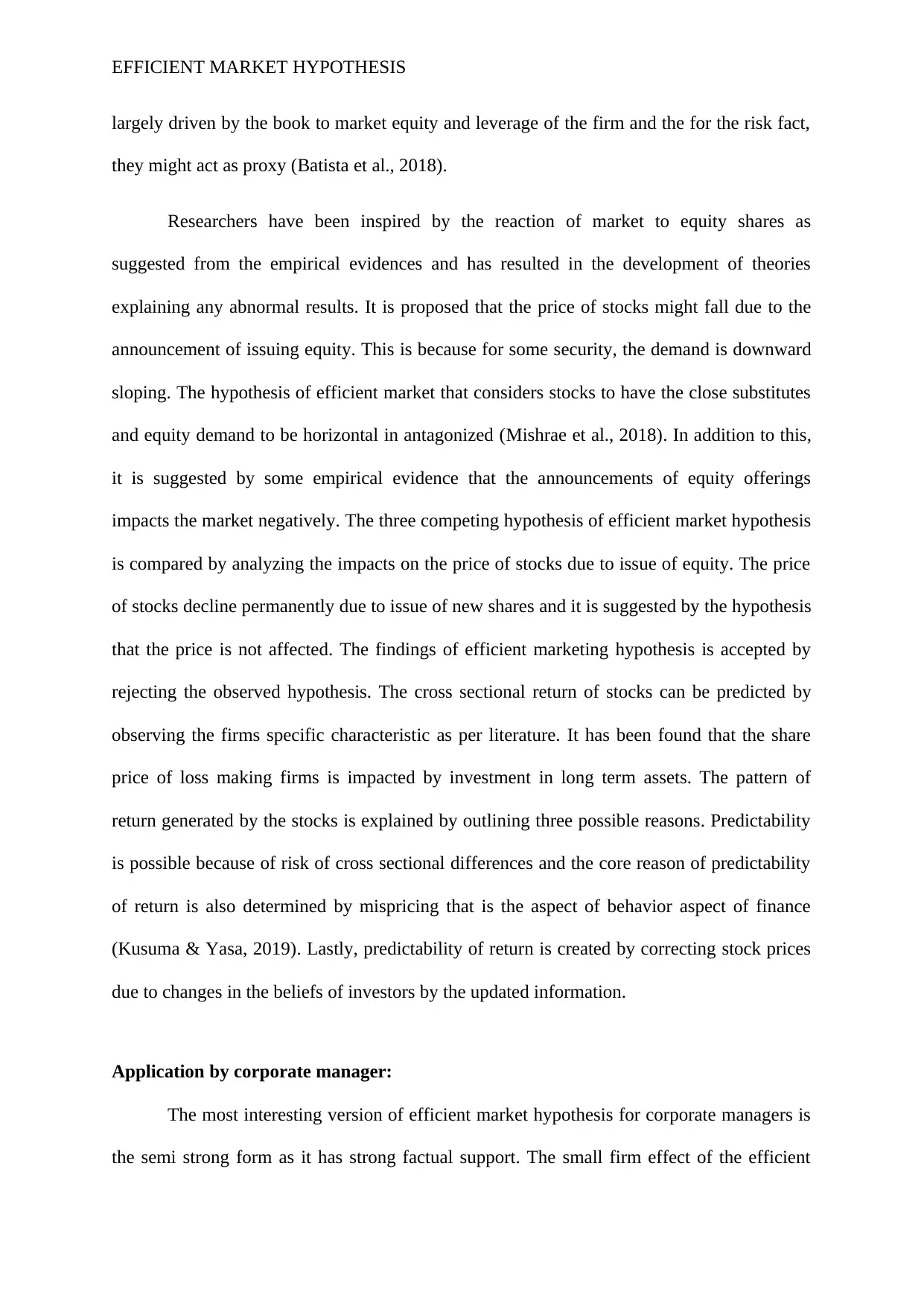
EFFICIENT MARKET HYPOTHESIS
largely driven by the book to market equity and leverage of the firm and the for the risk fact,
they might act as proxy (Batista et al., 2018).
Researchers have been inspired by the reaction of market to equity shares as
suggested from the empirical evidences and has resulted in the development of theories
explaining any abnormal results. It is proposed that the price of stocks might fall due to the
announcement of issuing equity. This is because for some security, the demand is downward
sloping. The hypothesis of efficient market that considers stocks to have the close substitutes
and equity demand to be horizontal in antagonized (Mishrae et al., 2018). In addition to this,
it is suggested by some empirical evidence that the announcements of equity offerings
impacts the market negatively. The three competing hypothesis of efficient market hypothesis
is compared by analyzing the impacts on the price of stocks due to issue of equity. The price
of stocks decline permanently due to issue of new shares and it is suggested by the hypothesis
that the price is not affected. The findings of efficient marketing hypothesis is accepted by
rejecting the observed hypothesis. The cross sectional return of stocks can be predicted by
observing the firms specific characteristic as per literature. It has been found that the share
price of loss making firms is impacted by investment in long term assets. The pattern of
return generated by the stocks is explained by outlining three possible reasons. Predictability
is possible because of risk of cross sectional differences and the core reason of predictability
of return is also determined by mispricing that is the aspect of behavior aspect of finance
(Kusuma & Yasa, 2019). Lastly, predictability of return is created by correcting stock prices
due to changes in the beliefs of investors by the updated information.
Application by corporate manager:
The most interesting version of efficient market hypothesis for corporate managers is
the semi strong form as it has strong factual support. The small firm effect of the efficient
largely driven by the book to market equity and leverage of the firm and the for the risk fact,
they might act as proxy (Batista et al., 2018).
Researchers have been inspired by the reaction of market to equity shares as
suggested from the empirical evidences and has resulted in the development of theories
explaining any abnormal results. It is proposed that the price of stocks might fall due to the
announcement of issuing equity. This is because for some security, the demand is downward
sloping. The hypothesis of efficient market that considers stocks to have the close substitutes
and equity demand to be horizontal in antagonized (Mishrae et al., 2018). In addition to this,
it is suggested by some empirical evidence that the announcements of equity offerings
impacts the market negatively. The three competing hypothesis of efficient market hypothesis
is compared by analyzing the impacts on the price of stocks due to issue of equity. The price
of stocks decline permanently due to issue of new shares and it is suggested by the hypothesis
that the price is not affected. The findings of efficient marketing hypothesis is accepted by
rejecting the observed hypothesis. The cross sectional return of stocks can be predicted by
observing the firms specific characteristic as per literature. It has been found that the share
price of loss making firms is impacted by investment in long term assets. The pattern of
return generated by the stocks is explained by outlining three possible reasons. Predictability
is possible because of risk of cross sectional differences and the core reason of predictability
of return is also determined by mispricing that is the aspect of behavior aspect of finance
(Kusuma & Yasa, 2019). Lastly, predictability of return is created by correcting stock prices
due to changes in the beliefs of investors by the updated information.
Application by corporate manager:
The most interesting version of efficient market hypothesis for corporate managers is
the semi strong form as it has strong factual support. The small firm effect of the efficient
⊘ This is a preview!⊘
Do you want full access?
Subscribe today to unlock all pages.

Trusted by 1+ million students worldwide
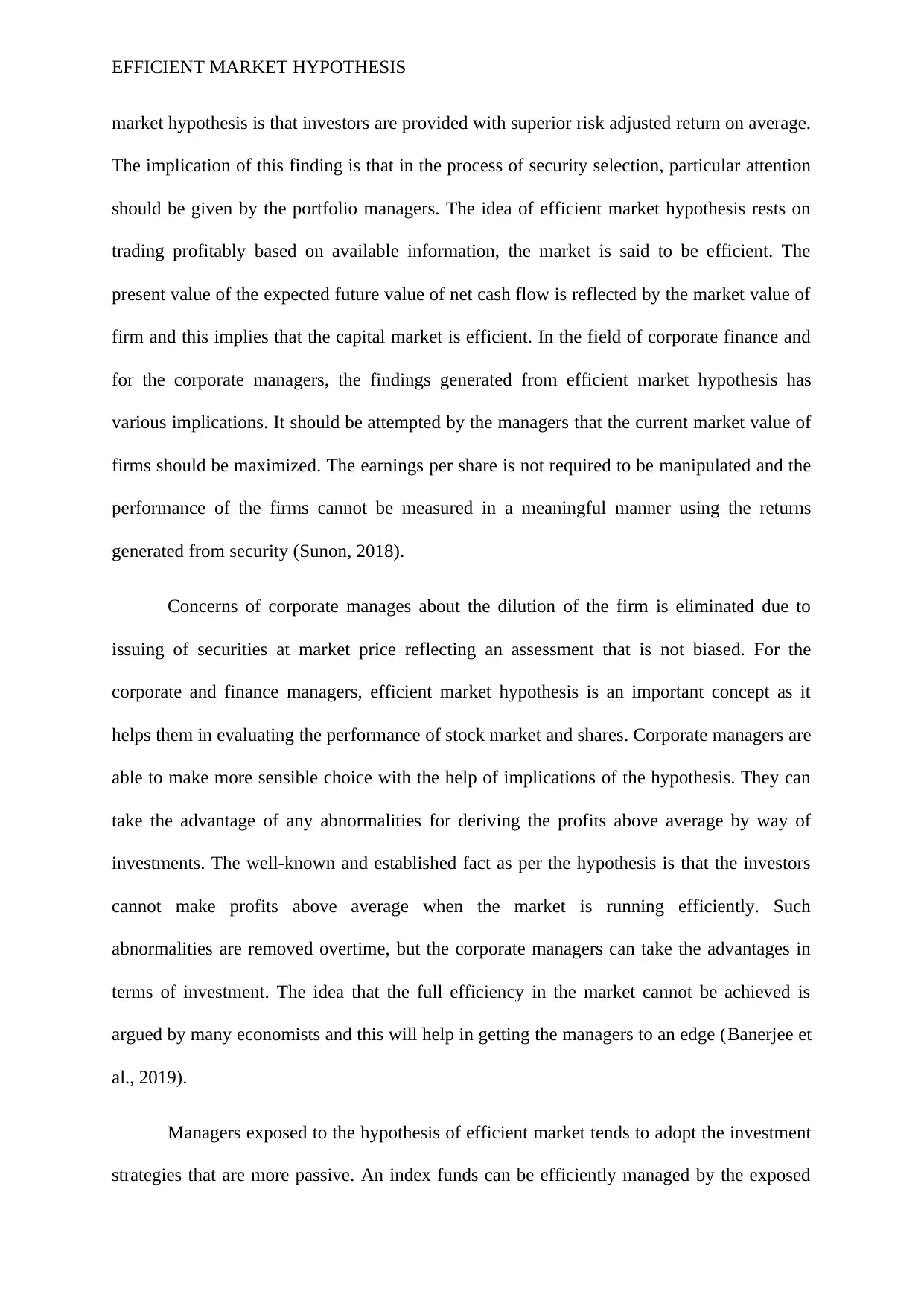
EFFICIENT MARKET HYPOTHESIS
market hypothesis is that investors are provided with superior risk adjusted return on average.
The implication of this finding is that in the process of security selection, particular attention
should be given by the portfolio managers. The idea of efficient market hypothesis rests on
trading profitably based on available information, the market is said to be efficient. The
present value of the expected future value of net cash flow is reflected by the market value of
firm and this implies that the capital market is efficient. In the field of corporate finance and
for the corporate managers, the findings generated from efficient market hypothesis has
various implications. It should be attempted by the managers that the current market value of
firms should be maximized. The earnings per share is not required to be manipulated and the
performance of the firms cannot be measured in a meaningful manner using the returns
generated from security (Sunon, 2018).
Concerns of corporate manages about the dilution of the firm is eliminated due to
issuing of securities at market price reflecting an assessment that is not biased. For the
corporate and finance managers, efficient market hypothesis is an important concept as it
helps them in evaluating the performance of stock market and shares. Corporate managers are
able to make more sensible choice with the help of implications of the hypothesis. They can
take the advantage of any abnormalities for deriving the profits above average by way of
investments. The well-known and established fact as per the hypothesis is that the investors
cannot make profits above average when the market is running efficiently. Such
abnormalities are removed overtime, but the corporate managers can take the advantages in
terms of investment. The idea that the full efficiency in the market cannot be achieved is
argued by many economists and this will help in getting the managers to an edge (Banerjee et
al., 2019).
Managers exposed to the hypothesis of efficient market tends to adopt the investment
strategies that are more passive. An index funds can be efficiently managed by the exposed
market hypothesis is that investors are provided with superior risk adjusted return on average.
The implication of this finding is that in the process of security selection, particular attention
should be given by the portfolio managers. The idea of efficient market hypothesis rests on
trading profitably based on available information, the market is said to be efficient. The
present value of the expected future value of net cash flow is reflected by the market value of
firm and this implies that the capital market is efficient. In the field of corporate finance and
for the corporate managers, the findings generated from efficient market hypothesis has
various implications. It should be attempted by the managers that the current market value of
firms should be maximized. The earnings per share is not required to be manipulated and the
performance of the firms cannot be measured in a meaningful manner using the returns
generated from security (Sunon, 2018).
Concerns of corporate manages about the dilution of the firm is eliminated due to
issuing of securities at market price reflecting an assessment that is not biased. For the
corporate and finance managers, efficient market hypothesis is an important concept as it
helps them in evaluating the performance of stock market and shares. Corporate managers are
able to make more sensible choice with the help of implications of the hypothesis. They can
take the advantage of any abnormalities for deriving the profits above average by way of
investments. The well-known and established fact as per the hypothesis is that the investors
cannot make profits above average when the market is running efficiently. Such
abnormalities are removed overtime, but the corporate managers can take the advantages in
terms of investment. The idea that the full efficiency in the market cannot be achieved is
argued by many economists and this will help in getting the managers to an edge (Banerjee et
al., 2019).
Managers exposed to the hypothesis of efficient market tends to adopt the investment
strategies that are more passive. An index funds can be efficiently managed by the exposed
Paraphrase This Document
Need a fresh take? Get an instant paraphrase of this document with our AI Paraphraser
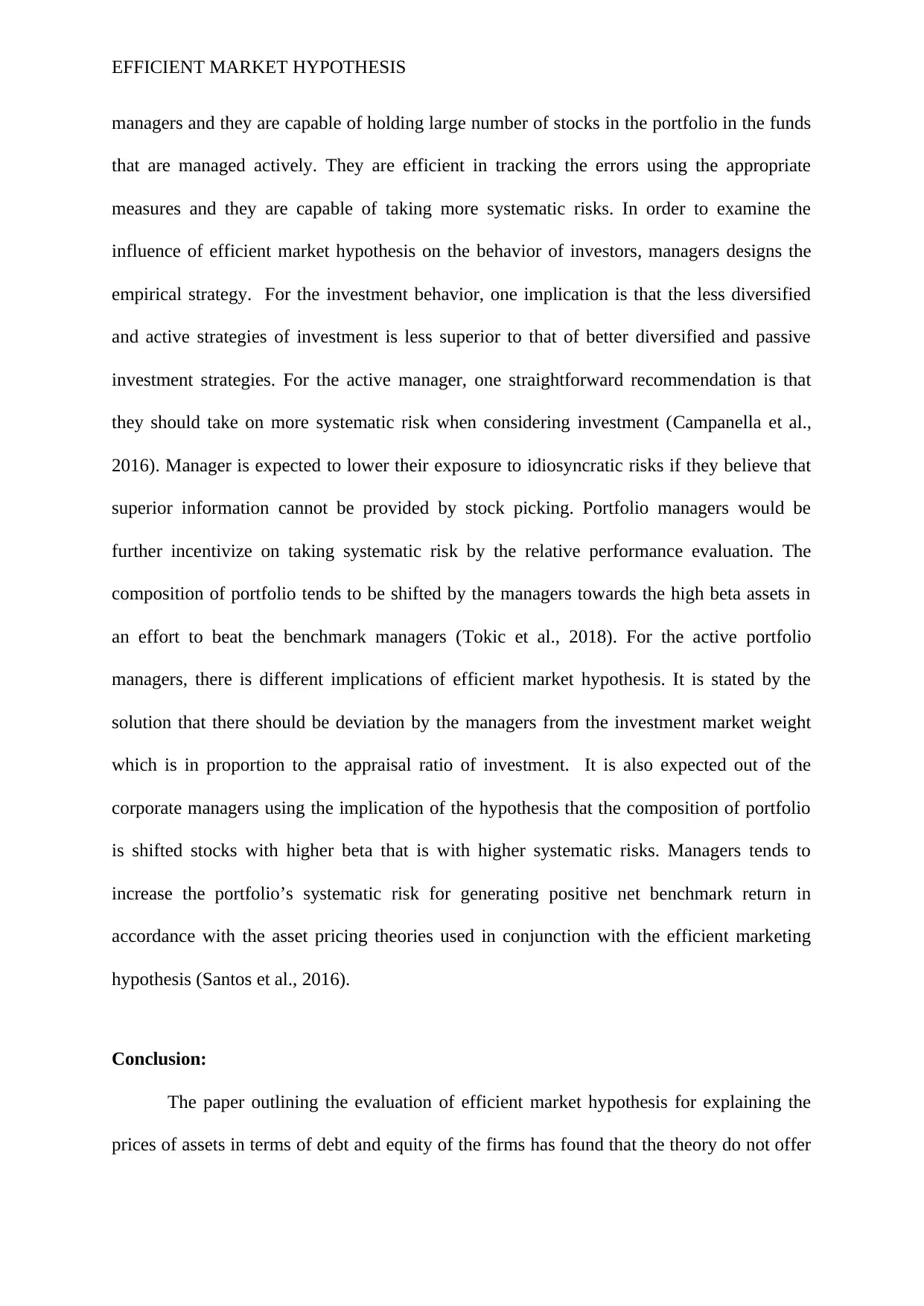
EFFICIENT MARKET HYPOTHESIS
managers and they are capable of holding large number of stocks in the portfolio in the funds
that are managed actively. They are efficient in tracking the errors using the appropriate
measures and they are capable of taking more systematic risks. In order to examine the
influence of efficient market hypothesis on the behavior of investors, managers designs the
empirical strategy. For the investment behavior, one implication is that the less diversified
and active strategies of investment is less superior to that of better diversified and passive
investment strategies. For the active manager, one straightforward recommendation is that
they should take on more systematic risk when considering investment (Campanella et al.,
2016). Manager is expected to lower their exposure to idiosyncratic risks if they believe that
superior information cannot be provided by stock picking. Portfolio managers would be
further incentivize on taking systematic risk by the relative performance evaluation. The
composition of portfolio tends to be shifted by the managers towards the high beta assets in
an effort to beat the benchmark managers (Tokic et al., 2018). For the active portfolio
managers, there is different implications of efficient market hypothesis. It is stated by the
solution that there should be deviation by the managers from the investment market weight
which is in proportion to the appraisal ratio of investment. It is also expected out of the
corporate managers using the implication of the hypothesis that the composition of portfolio
is shifted stocks with higher beta that is with higher systematic risks. Managers tends to
increase the portfolio’s systematic risk for generating positive net benchmark return in
accordance with the asset pricing theories used in conjunction with the efficient marketing
hypothesis (Santos et al., 2016).
Conclusion:
The paper outlining the evaluation of efficient market hypothesis for explaining the
prices of assets in terms of debt and equity of the firms has found that the theory do not offer
managers and they are capable of holding large number of stocks in the portfolio in the funds
that are managed actively. They are efficient in tracking the errors using the appropriate
measures and they are capable of taking more systematic risks. In order to examine the
influence of efficient market hypothesis on the behavior of investors, managers designs the
empirical strategy. For the investment behavior, one implication is that the less diversified
and active strategies of investment is less superior to that of better diversified and passive
investment strategies. For the active manager, one straightforward recommendation is that
they should take on more systematic risk when considering investment (Campanella et al.,
2016). Manager is expected to lower their exposure to idiosyncratic risks if they believe that
superior information cannot be provided by stock picking. Portfolio managers would be
further incentivize on taking systematic risk by the relative performance evaluation. The
composition of portfolio tends to be shifted by the managers towards the high beta assets in
an effort to beat the benchmark managers (Tokic et al., 2018). For the active portfolio
managers, there is different implications of efficient market hypothesis. It is stated by the
solution that there should be deviation by the managers from the investment market weight
which is in proportion to the appraisal ratio of investment. It is also expected out of the
corporate managers using the implication of the hypothesis that the composition of portfolio
is shifted stocks with higher beta that is with higher systematic risks. Managers tends to
increase the portfolio’s systematic risk for generating positive net benchmark return in
accordance with the asset pricing theories used in conjunction with the efficient marketing
hypothesis (Santos et al., 2016).
Conclusion:
The paper outlining the evaluation of efficient market hypothesis for explaining the
prices of assets in terms of debt and equity of the firms has found that the theory do not offer
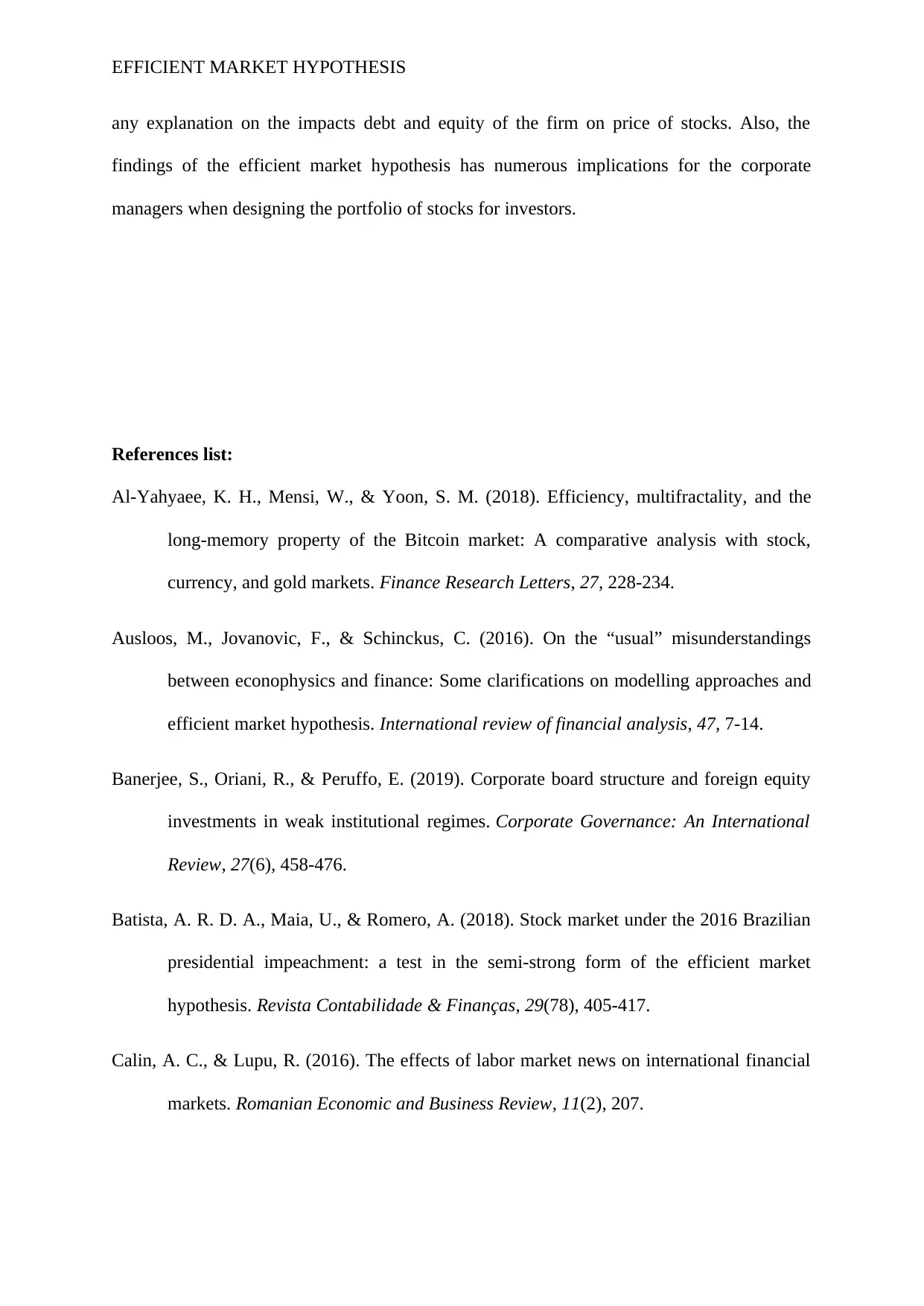
EFFICIENT MARKET HYPOTHESIS
any explanation on the impacts debt and equity of the firm on price of stocks. Also, the
findings of the efficient market hypothesis has numerous implications for the corporate
managers when designing the portfolio of stocks for investors.
References list:
Al-Yahyaee, K. H., Mensi, W., & Yoon, S. M. (2018). Efficiency, multifractality, and the
long-memory property of the Bitcoin market: A comparative analysis with stock,
currency, and gold markets. Finance Research Letters, 27, 228-234.
Ausloos, M., Jovanovic, F., & Schinckus, C. (2016). On the “usual” misunderstandings
between econophysics and finance: Some clarifications on modelling approaches and
efficient market hypothesis. International review of financial analysis, 47, 7-14.
Banerjee, S., Oriani, R., & Peruffo, E. (2019). Corporate board structure and foreign equity
investments in weak institutional regimes. Corporate Governance: An International
Review, 27(6), 458-476.
Batista, A. R. D. A., Maia, U., & Romero, A. (2018). Stock market under the 2016 Brazilian
presidential impeachment: a test in the semi-strong form of the efficient market
hypothesis. Revista Contabilidade & Finanças, 29(78), 405-417.
Calin, A. C., & Lupu, R. (2016). The effects of labor market news on international financial
markets. Romanian Economic and Business Review, 11(2), 207.
any explanation on the impacts debt and equity of the firm on price of stocks. Also, the
findings of the efficient market hypothesis has numerous implications for the corporate
managers when designing the portfolio of stocks for investors.
References list:
Al-Yahyaee, K. H., Mensi, W., & Yoon, S. M. (2018). Efficiency, multifractality, and the
long-memory property of the Bitcoin market: A comparative analysis with stock,
currency, and gold markets. Finance Research Letters, 27, 228-234.
Ausloos, M., Jovanovic, F., & Schinckus, C. (2016). On the “usual” misunderstandings
between econophysics and finance: Some clarifications on modelling approaches and
efficient market hypothesis. International review of financial analysis, 47, 7-14.
Banerjee, S., Oriani, R., & Peruffo, E. (2019). Corporate board structure and foreign equity
investments in weak institutional regimes. Corporate Governance: An International
Review, 27(6), 458-476.
Batista, A. R. D. A., Maia, U., & Romero, A. (2018). Stock market under the 2016 Brazilian
presidential impeachment: a test in the semi-strong form of the efficient market
hypothesis. Revista Contabilidade & Finanças, 29(78), 405-417.
Calin, A. C., & Lupu, R. (2016). The effects of labor market news on international financial
markets. Romanian Economic and Business Review, 11(2), 207.
⊘ This is a preview!⊘
Do you want full access?
Subscribe today to unlock all pages.

Trusted by 1+ million students worldwide
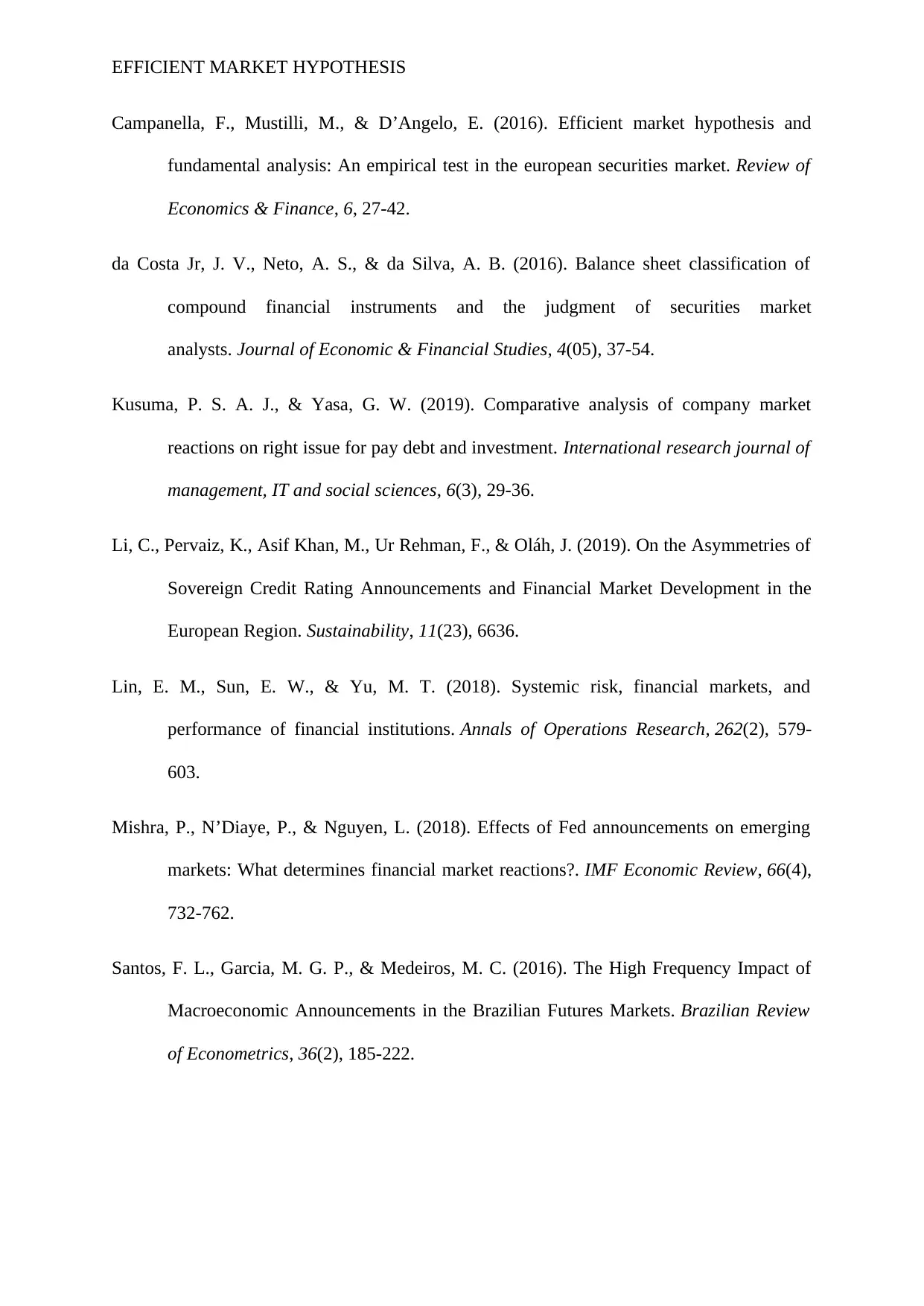
EFFICIENT MARKET HYPOTHESIS
Campanella, F., Mustilli, M., & D’Angelo, E. (2016). Efficient market hypothesis and
fundamental analysis: An empirical test in the european securities market. Review of
Economics & Finance, 6, 27-42.
da Costa Jr, J. V., Neto, A. S., & da Silva, A. B. (2016). Balance sheet classification of
compound financial instruments and the judgment of securities market
analysts. Journal of Economic & Financial Studies, 4(05), 37-54.
Kusuma, P. S. A. J., & Yasa, G. W. (2019). Comparative analysis of company market
reactions on right issue for pay debt and investment. International research journal of
management, IT and social sciences, 6(3), 29-36.
Li, C., Pervaiz, K., Asif Khan, M., Ur Rehman, F., & Oláh, J. (2019). On the Asymmetries of
Sovereign Credit Rating Announcements and Financial Market Development in the
European Region. Sustainability, 11(23), 6636.
Lin, E. M., Sun, E. W., & Yu, M. T. (2018). Systemic risk, financial markets, and
performance of financial institutions. Annals of Operations Research, 262(2), 579-
603.
Mishra, P., N’Diaye, P., & Nguyen, L. (2018). Effects of Fed announcements on emerging
markets: What determines financial market reactions?. IMF Economic Review, 66(4),
732-762.
Santos, F. L., Garcia, M. G. P., & Medeiros, M. C. (2016). The High Frequency Impact of
Macroeconomic Announcements in the Brazilian Futures Markets. Brazilian Review
of Econometrics, 36(2), 185-222.
Campanella, F., Mustilli, M., & D’Angelo, E. (2016). Efficient market hypothesis and
fundamental analysis: An empirical test in the european securities market. Review of
Economics & Finance, 6, 27-42.
da Costa Jr, J. V., Neto, A. S., & da Silva, A. B. (2016). Balance sheet classification of
compound financial instruments and the judgment of securities market
analysts. Journal of Economic & Financial Studies, 4(05), 37-54.
Kusuma, P. S. A. J., & Yasa, G. W. (2019). Comparative analysis of company market
reactions on right issue for pay debt and investment. International research journal of
management, IT and social sciences, 6(3), 29-36.
Li, C., Pervaiz, K., Asif Khan, M., Ur Rehman, F., & Oláh, J. (2019). On the Asymmetries of
Sovereign Credit Rating Announcements and Financial Market Development in the
European Region. Sustainability, 11(23), 6636.
Lin, E. M., Sun, E. W., & Yu, M. T. (2018). Systemic risk, financial markets, and
performance of financial institutions. Annals of Operations Research, 262(2), 579-
603.
Mishra, P., N’Diaye, P., & Nguyen, L. (2018). Effects of Fed announcements on emerging
markets: What determines financial market reactions?. IMF Economic Review, 66(4),
732-762.
Santos, F. L., Garcia, M. G. P., & Medeiros, M. C. (2016). The High Frequency Impact of
Macroeconomic Announcements in the Brazilian Futures Markets. Brazilian Review
of Econometrics, 36(2), 185-222.
Paraphrase This Document
Need a fresh take? Get an instant paraphrase of this document with our AI Paraphraser
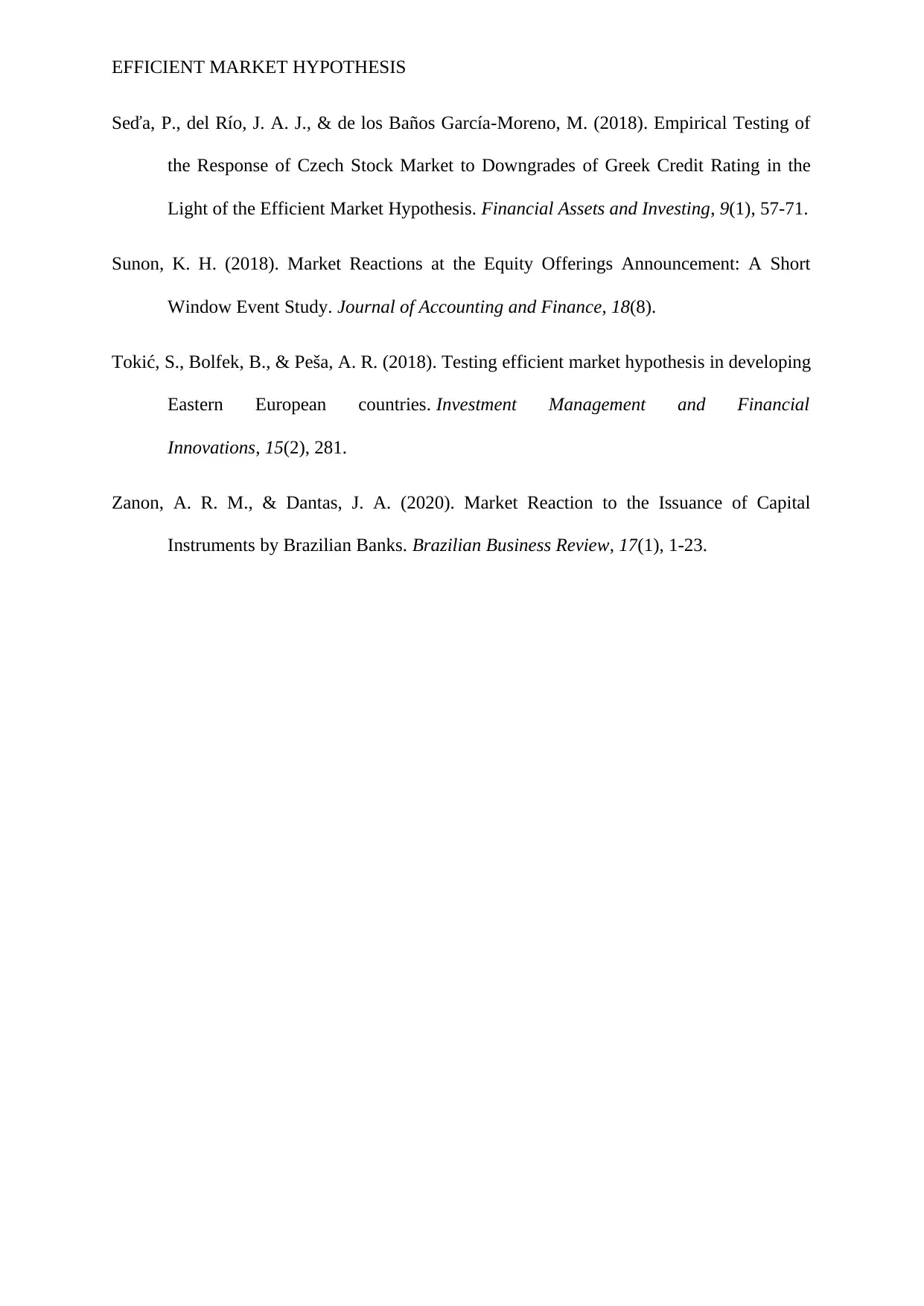
EFFICIENT MARKET HYPOTHESIS
Seďa, P., del Río, J. A. J., & de los Baños García-Moreno, M. (2018). Empirical Testing of
the Response of Czech Stock Market to Downgrades of Greek Credit Rating in the
Light of the Efficient Market Hypothesis. Financial Assets and Investing, 9(1), 57-71.
Sunon, K. H. (2018). Market Reactions at the Equity Offerings Announcement: A Short
Window Event Study. Journal of Accounting and Finance, 18(8).
Tokić, S., Bolfek, B., & Peša, A. R. (2018). Testing efficient market hypothesis in developing
Eastern European countries. Investment Management and Financial
Innovations, 15(2), 281.
Zanon, A. R. M., & Dantas, J. A. (2020). Market Reaction to the Issuance of Capital
Instruments by Brazilian Banks. Brazilian Business Review, 17(1), 1-23.
Seďa, P., del Río, J. A. J., & de los Baños García-Moreno, M. (2018). Empirical Testing of
the Response of Czech Stock Market to Downgrades of Greek Credit Rating in the
Light of the Efficient Market Hypothesis. Financial Assets and Investing, 9(1), 57-71.
Sunon, K. H. (2018). Market Reactions at the Equity Offerings Announcement: A Short
Window Event Study. Journal of Accounting and Finance, 18(8).
Tokić, S., Bolfek, B., & Peša, A. R. (2018). Testing efficient market hypothesis in developing
Eastern European countries. Investment Management and Financial
Innovations, 15(2), 281.
Zanon, A. R. M., & Dantas, J. A. (2020). Market Reaction to the Issuance of Capital
Instruments by Brazilian Banks. Brazilian Business Review, 17(1), 1-23.

EFFICIENT MARKET HYPOTHESIS
⊘ This is a preview!⊘
Do you want full access?
Subscribe today to unlock all pages.

Trusted by 1+ million students worldwide
1 out of 12
Related Documents
Your All-in-One AI-Powered Toolkit for Academic Success.
+13062052269
info@desklib.com
Available 24*7 on WhatsApp / Email
![[object Object]](/_next/static/media/star-bottom.7253800d.svg)
Unlock your academic potential
Copyright © 2020–2026 A2Z Services. All Rights Reserved. Developed and managed by ZUCOL.





